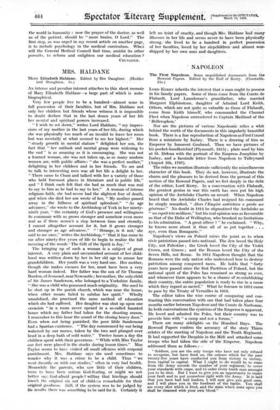MRS. HALDANE
Mary .Elizabeth Haldane. Edited by Her Daughter. (Hodder
and Stoughton. 5s.) - -
AN intense and peculiar interest attaches to this short memoir of Mary Elizabeth Haldane—a large part of which is auto- biographical.
Very few people live to be a hundred—almost none in full posiession of their faculties, but of Mrs. Haldane not only her children but friends whose witness it is impossible to doubt declare that in the last dozen years- of her life her mental and spiritual powers increased.
" I wish to set down," writes Lord Haldane, " my impres- sions of my mother in the last years of her life, during which she was -physically too much of an invalid to leave her room but was mentally at what seemed to me her highest." Her " steady growth in mental stature" delighted her son, the fact that " her outlook and mental grasp were widening to the end " is as amazing as it is encouraging. She was not a learned woman, she was not taken up, as so many modern women are, with public affairs : " she was a perfect mother," delighting in her children and in her friends. To see and to talk to interesting, men was all her life a delight to her. " There came to Cloan and talked with her a variety of those who held foremost places in literature and in public life," and " I think each felt that she had as much that was real to say to him as he had to say to her." A woman of intense religious faith. she had never had the slightest fear of death, and when she died her son wrote of her, " My mother passed away in the fullness of spiritual splendour." " As age advances," she wrote to the Archbishop of York in her ninety- ninth year, " the certainty of God's presence and willingness to commune with us grows stronger and somehoiir even more real as if there weren't a step between time and eternity. I cannot altogether account for it, but it grows stronger and stronger as age advances." t` ' Strange, is it not,' she said to me once," writes the Archbishop, " ' that it has come-to me after ninety-five years of life to begin to realize the full meaning of the words ' The Gift of the Spirit is Joy.' " The bringing up of such a woman is a subject of great interest. A very plain and unvarnished account of her child- hood was written, down by her in her old age to amuse her grandchildren. Her youth was a very hard one. Her mother, though she makes excuses for her, must have been a very hard woman indeed. Her father was the son of Sir Thomas Bunion, of Jesmond, near Newcastle ; her mother, the only child of Sir James Sanderson, who belonged to a Yorkshire family, "She was a child who possessed much originality. She used to be shut up in the parish church, which was near the house, when other means failed to subdue her spirit." Wholly unsubdued,. she practised the same method of education which she had suffered. Her daughter was shut up upon one occasion " in a . room never opened in a so-called haunted house which my father had taken for the shooting season. I remember to this-hour the sound of the closing heavy door." Even when - not being punished, the poor- little Sandersons had a Spartan existence. " The day commenced by our being wakened by our nurses, taken by the two and plunged over head in a deep bath of cold water." Twelve hours a day the children spent with their governess.-- " While with Miss Taylor our feet were placed in the stocks during lesson times." Miss Taylor seems to have visited all small offences with corporal punishment. Mrs. Haldane 'says she Used sometimes to wonder why it was- a crime to be a child. Thus " we went drearily on with our studies," often in very bad health. Meanwhile thti parents, who saw little of their children, seem to have been serious God-fearing, or might we not better say, God-afraid people ? wining that hirelings should knock the original sin out of child.:ar remarkable for their original goodness. Still, if the system was to be judged by its results there was something to be said for it. Certainly it left no taint of cruelty, and though Mrs. Haldane had many illnesses in her life and seems never to have been physically strong,- -she lived to be a hundred in perfect possession of her faculties,' loved by her stepchildren and almost wor- shipped by her own sons anctdaughters.






























































 Previous page
Previous page